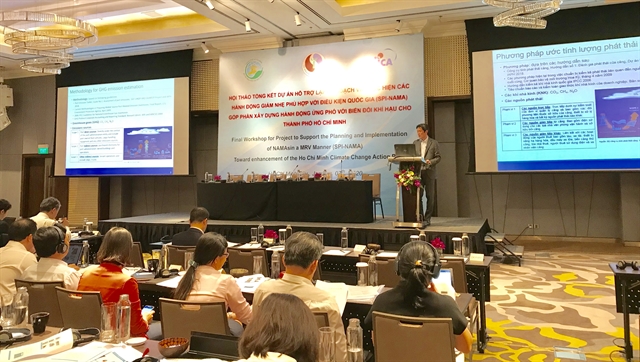 Environment
Environment


|
| Speakers at a workshop held in HCM City on Tuesday to review a project to Support the Planning and Implementation of Nationally Appropriate Mitigation Actions. VNS Photo Bồ Xuân Hiệp |
HCM CITY — Việt Nam must continue to take “concrete climate actions” to become a low-carbon economy and comply with the global Paris Agreement, a workshop heard in HCM City yesterday.
Hiromichi Murakami, deputy director general of the Japan International Cooperation Agency (JICA) Headquarters’ Global Environment Department, said Việt Nam, as a member of the global community, played a major role in the implementation of the agreement.
“The efforts made by the Vietnamese Government, especially HCM City authorities, [are a] clear signal that both the central and local governments will take the leadership in enhancing climate actions to realise a low carbon and decarbonising society.”
The workshop was held to review JICA’s project for “Support the Planning and Implementation of Nationally Appropriate Mitigation Actions in a Measurable, Reportable and Verifiable Manner”.
The project, begun in 2015, aims to strengthen the role of the state in promoting mitigation policies to support its implementation of the agreement.
It also supports efforts to create a greenhouse gas (GHG) emissions reduction roadmap.
It conducted a low-carbon technology assessment on mitigation options under the Nationally Determined Contribution Việt Nam has committed to under the agreement.
GHG emissions in HCM City
Japanese experts have provided training to staff at the city's Department of Natural Resources and Environment in using the Asia-Pacific Integrated Model to visualise future GHG emission trends.
Based on the simulation results of the model, the city will be able to take potential mitigation actions for its Climate Change Action Plan.
According to the results, by 2030 GHG emissions in the city would increase by around 2.6 times from 2016 levels without any mitigation actions.
But with effective mitigation actions, it could reduce the emissions by around 20 per cent compared to the no-mitigation-action scenario, according to JICA.
Recommendations for the new Climate Change Action Plan have been submitted to the department.
Japanese experts have also done an energy efficiency review for buildings in the city and recommended a carbon reporting system like the one applied by the Tokyo metropolitan government.
With the system, Tokyo was able to reduce energy consumption by 16 per cent in 2000-12, JICA said.
Nguyễn Toàn Thắng, director of the department, said: “The experience of Tokyo is very useful for HCM City as the number of buildings in the city has increased quickly. The system will also help raise occupants’ awareness of energy saving.
“The project’s most significant achievements are its support for the development of Việt Nam’s contribution to international climate change efforts in the form of its Nationally Determined Contribution to the Paris Agreement.”
Việt Nam’s rapid economic growth in recent years has been energy dependent as the country’s energy system has become more carbon intensive, according to experts.
The country is vulnerable to climate change due to its long coastline and extensive river estuaries, which has forced it to develop a policy committed to taking action on climate change.
Việt Nam was quick to ratify the Paris Agreement and was one of the very first countries to develop a plan of action for the implementation of the agreement, which specifies necessary measures, responsibilities and specific support requirements.
However, the country still lacks implementation experience, according to experts.
The Paris Agreement is an agreement within the United Nations Framework Convention on Climate Change dealing with mitigation of greenhouse gas emissions signed in 2016.
The workshop was organised by JICA, the Ministry of Natural Resources and Environment and the city’s Department of Natural Resources and Environment. — VNS




